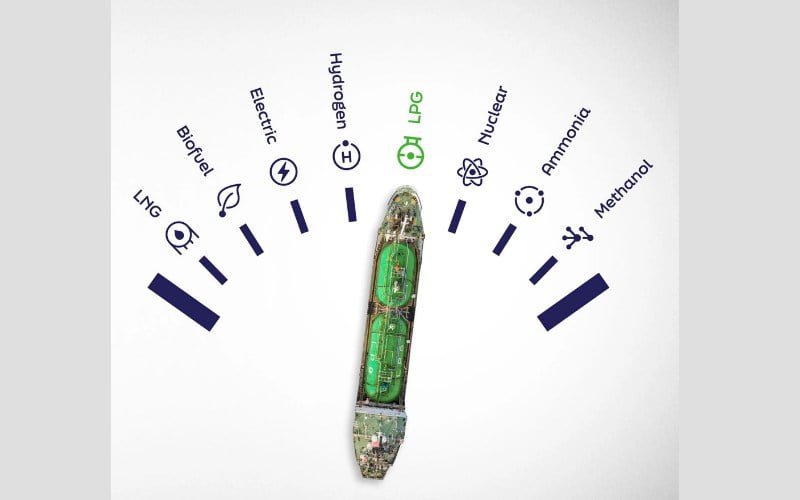A recent joint report from Lloyd’s Register (LR) and the World Liquid Gas Association (WLGA) has shed light on the promising potential of liquefied petroleum gas (LPG) as a low-carbon marine fuel. Titled “Fuel for Thought: LPG” the report underscores the cost, availability, and lifecycle assessment benefits of utilizing LPG in various vessel types.
The report emphasizes that adopting LPG as a marine fuel could lead to a significant reduction in carbon emissions, especially when combined with other emissions reduction and energy-saving technologies. This alignment with stricter regulations anticipated in the coming decade positions LPG as a compelling option for shipowners striving for environmental compliance.
Key findings indicate a growing market for dual-fuel LPG engines, driven by a robust order book. Compared to existing alternatives, LPG presents itself as a cleaner, lower-carbon energy source for marine applications. The report suggests that integrating LPG with technologies like Onboard Carbon Capture and Storage (OCCS) can further diminish a vessel’s emissions profile, thereby reducing the necessary CO2 storage capacity due to lower emissions from LPG combustion. This not only enhances operational efficiency but also facilitates compliance with future regulatory standards.
Despite these advantages, the report highlights the need for advancements in technology readiness to fully realize LPG’s potential as a marine fuel. While LPG is a well-established option, the current range of engine technologies must be expanded to accommodate its widespread adoption across different vessel types. Notably, the absence of a four-stroke marine engine capable of utilizing LPG necessitates decarbonizing auxiliary engines through supplementary fuels.
Moreover, the establishment of a safe bunkering framework is deemed essential to incentivize the uptake of LPG. Although regulatory frameworks are still in their nascent stages, recent interim guidelines from the International Maritime Organization (IMO) signal progress in this direction.
Panos Mitrou, Global Gas Segment Director at Lloyd’s Register, said “The pace and scale of renewable production for LPG remain critical factors in initiating the wider adoption of LPG as a marine fuel. Supportive energy-saving technologies, along with potentially maturing onboard carbon capture and storage, will further assist in making LPG a viable low-zero carbon fuel. By ensuring this, LPG could offer attractive operating and capital costs compared to other alternative fuels as shipowners look to decarbonize their fleets in line with more stringent regulations.”
Nikos Xydas, World Liquid Gas Association Technical Director, said “LPG stands as a unique and exceptional energy source, pivotal for decarbonizing the shipping sector. Stored and transported as a liquid and consumed as a gas, it is well recognized for its lower emission benefits as a marine fuel. With a surge in orders for LPG-fueled ships, it’s clear that LPG’s role in the shipping industry is expanding.”
“As the world moves toward deep decarbonization targets, LPG emerges as an ideal fuel for all vessel types, offering a cleaner alternative fuel today and a pathway for an even cleaner future tomorrow. Its flexibility, low emissions, and cost-effectiveness position LPG as the potential fuel of choice in the shipping sector, paving the way for low-cost deep-sea decarbonization with the advent of bio/renewable LPG.”
World Liquid Gas Association (WLGA)
The World Liquid Gas Association (WLGA) advocates for the use of Liquid Gas to cultivate a safer, cleaner, healthier, and more prosperous global community. As the authoritative voice of the global Liquid Gas industry, WLGA represents the entire Liquid Gas value chain, uniting over 300 private and public companies across more than 125 countries. Through partnerships with international organizations and the implementation of projects on local and global scales, WLGA strives to advance its mission.
Established in 1987 and granted Special Consultative Status with the United Nations Economic and Social Council in 1989, WLGA operates under a Three-Year Strategic Review framework, ensuring optimal value for its membership. The current strategic review, spanning 2023-2025, focuses on “Solutions for Sustainable Energy Transitions.” WLGA’s mission statement delineates four core goals for this period: Advocacy (ADV), Safety and Business Improvement (SBI), Innovation & Growth (IGO), and Communications & Awareness (COM).
About Lloyd’s Register (LR)
Lloyd’s Register started out in 1760 as a marine classification society. Today, Lloyd’s Register is one of the world’s leading providers of professional services for engineering and technology – improving safety and increasing the performance of critical infrastructures for customers in over 75 countries worldwide. The profits we generate fund the Lloyd’s Register Foundation, a charity that supports engineering-related research, education, and public engagement around everything we do. All of this helps us stand by the purpose that drives us every single day: working together for a safer world.
Source Lloyd’s Register

